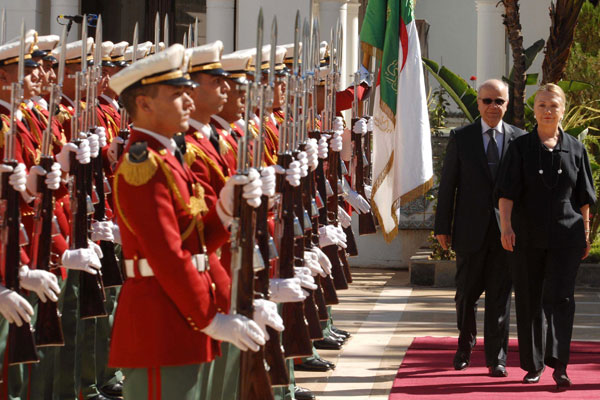On Monday, Secretary of State Hillary Clinton traveled to Algeria to discuss the ongoing security crisis in Mali. Clinton’s visit not only revealed Washington’s increasing openness to military intervention in northern Mali, but it also highlighted Algeria’s regional influence and complicated relationships with its southern neighbors.
Since Islamist militants occupied northern Mali last April, the fractured interim government in Bamako and the Economic Community of West African States (ECOWAS) have called for military action to retake the lost territory. Last month, the United Nations Security Council unanimously approved a resolution providing military and security planners to assist ECOWAS and the African Union in drafting a plan for intervention in coordination with Mali’s transitional government.
At first, the Obama Administration was opposed to military intervention. In congressional testimony, Assistant Secretary for African Affairs Johnnie Carson called the peacekeeping mission “ill-advised” and “not feasible.” Carson further asserted that before any military intervention could take place, restoration of governance in Bamako was necessary.
However, recent statements demonstrate that the Administration’s position has changed. In September, Carson stated that Mali should accept ECOWAS’s support in countering terrorism. Then, last month, Carson suggested that the “great progress” demonstrated militarily by the Africa Union Mission to Somalia could be a useful model for northern Mali.
Secretary Clinton’s visit to Algeria further emphasizes Algeria’s importance to shaping a solution to Mali’s security crisis. Algeria is Mali’s northern neighbor and the region’s premier military power. Therefore, any effort to reclaim northern Mali would undoubtedly impact Algeria’s borders and internal security.
Yet, despite its military prowess, Algeria is a reluctant leader and maintains a strict policy of nonintervention. Not a member of ECOWAS, Algeria considers Mali’s setbacks as consequences of its own making. After all, Mali’s complicity and, at times, outright coordination with criminal and terrorist networks allowed nefarious actors to entrench their operations. Such judgment, however, is hypocritical considering that al-Qaeda in the Islamic Maghreb, one of the groups operating in northern Mali, is based in Algeria.
Complicating the regional dynamics is France’s support for ECOWAS’s military engagement. Protective of its sovereignty, Algeria is suspicious of any operation in which its former colonial ruler wields influence. Because of such volatile conditions, the United States is viewed as a less biased actor—hence Secretary Clinton’s visit.
It is too early to tell how Algeria will work with its neighbors in resolving the crisis in northern Mali. However, it’s clear that Algeria’s geography will give the reluctant leader little choice but to play an active role.
